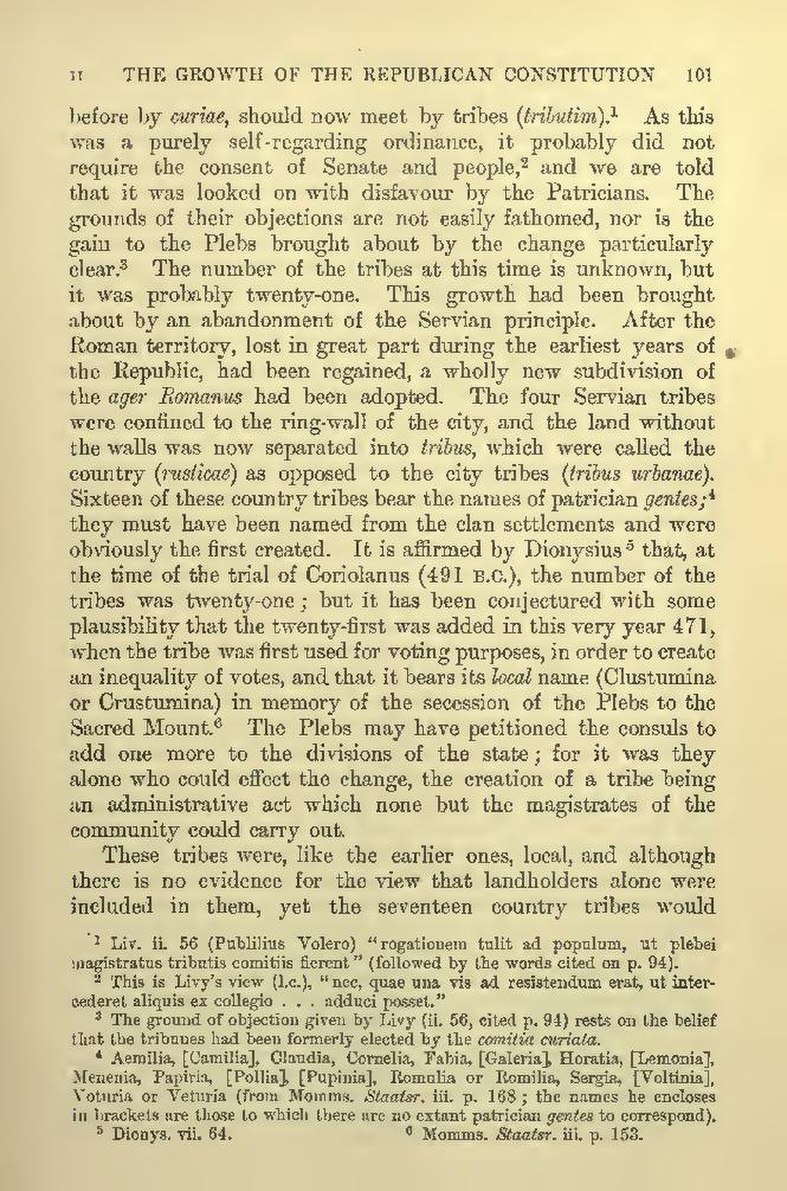before by curiae, should now meet by tribes (tributim).[1] As this was a purely self-regarding ordinance, it probably did not require the consent of Senate and people,[2] and we are told that it was looked on with disfavour by the Patricians. The grounds of their objections are not easily fathomed, nor is the gain to the Plebs brought about by the change particularly clear.[3] The number of the tribes at this time is unknown, but it was probably twenty-one. This growth had been brought about by an abandonment of the Servian principle. After the Roman territory, lost in great part during the earliest years of the Republic, had been regained, a wholly new subdivision of the ager Romanus had been adopted. The four Servian tribes were confined to the ring-wall of the city, and the land without the walls was now separated into tribus, which were called the country (rusticae) as opposed to the city tribes (tribus urbanae). Sixteen of these country tribes bear the names of patrician gentes;[4] they must have been named from the clan settlements and were obviously the first created. It is affirmed by Dionysius[5] that, at the time of the trial of Coriolanus (491 B.C.), the number of the tribes was twenty-one; but it has been conjectured with some plausibility that the twenty-first was added in this very year 471, when the tribe was first used for voting purposes, in order to create an inequality of votes, and that it bears its local name (Clustumina or Crustumina) in memory of the secession of the Plebs to the Sacred Mount.[6] The Plebs may have petitioned the consuls to add one more to the divisions of the state; for it was they alone who could effect the change, the creation of a tribe being an administrative act which none but the magistrates of the community could carry out.
These tribes were, like the earlier ones, local, and although there is no evidence for the view that landholders alone were included in them, yet the seventeen country tribes would, Claudia, Cornelia, Fabia, [Galeria], Horatia, [Lemonia], Menenia, Papiria, [Pollia], [Pupinia], Romulia or Romilia, Sergia, [Voltinia], Voturia or Veturia (from Momms. Staatsr. iii. p. 168; the names he encloses in brackets are those to which there are no extant patrician gentes to correspond).]
- ↑ Liv. ii 56 (Publilius Volero) "rogationem tulit ad populum, ut plebei magistratus tributis comitiis fierent" (followed by the words cited on p. 94).
- ↑ This is Livy's view (l.c.), "nec, quae una vis ad resistendum erat, ut intercederet aliquis ex collegio . . . adduci posset."
- ↑ The ground of objection given by Livy (ii. 56, cited p. 94) rests on the belief that the tribunes had been formerly elected by the comitia curiata.
- ↑ Aemilia, [Camilia
- ↑ Dionys. vii. 64.
- ↑ Momms. Staatsr. iii. p. 153.
